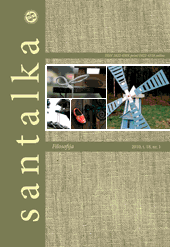Therapeutic Potential of Transcendental Inquiry in the Husserlian Philosophy
Therapeutic Potential of Transcendental Inquiry in the Husserlian Philosophy
Author(s): Witold PłotkaSubject(s): Philosophy
Published by: Vilnius Gediminas Technical University
Keywords: phenomenology; transcendentalism; reduction; questioning
Summary/Abstract: The main purpose of the article is to reconstruct a therapeutic potential of phenomenology, in particular, within Edmund Husserl’s and Eugen Fink’s program of transcendental inquiry about time. However, the Project of objective claims of phenomenology, which is presented in the Logical Investigations seems to exclude all therapeutic approach. Rather, the program postulates the striving for abstract “truths in themselves,” also it ignores the surrounding world, as well as intersubjectivity, and finally leads to the solitary life of a phenomenologist. How then is the therapeutic potential of phenomenology possible? The case of questioning plays the crucial role in the context of objective science. According to Husserl, each science which does not allow to ask “the most burning questions” is naļve, and therefore it limits the therapeutic potential. While focusing on propositions, objective phenomenology excludes all questions, indeed. In contrast to such a view, transcendental phenomenology allows to ask over and over again, and by doing so, it introduces the world, as well as intersubjectivity as horizons of phenomenological inquiry. Concluding, Husserl’s collaboration with Fink presents such a communal effort into questioning about time. Therefore, “therapeutic potential” of phenomenology means precisely the methodological movement of the possibility for communal formulation of transcendental investigation.
Journal: Santalka: Filologija, Edukologija
- Issue Year: 18/2010
- Issue No: 3
- Page Range: 81-91
- Page Count: 11
- Language: English

